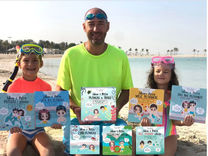Blog guest: Miha Potočnik – What is swimming good for?
- Sep 21, 2020
- 5 min read
Updated: Sep 27, 2020
Why do children behave better after swimming? What is swimming good for? From his wealth of experience in working with children and top swimmers, Miha Potočnik is giving us the answers. Miha had coached Sara Isaković for about eight years before she went to the 2008 Olympics in Beijing to win a medal. It was also the first Olympic medal won in the history of Slovenian swimming.
There’s a little champion in every child, “a golden swimmer”… our #Blog guest for the Swimming Dad, Miha is telling us how we can recognise him/her.
Today, Miha lives and works in Slovenia and teaches some new kids about the true values in and outside the pool.
What is swimming good for?
Swimming skills today are part of general knowledge of every individual. Not a single primary-school pupil should allow himself/herself to finish primary school without having mastered swimming skills. In the first trimester, all the pupils have to attend the mandatory swimming course of twenty hours.
The foundations of swimming will stay there forever, which makes you feel safe in the water and minimizes the chances of drowning.
Swimming gives us a harmonic psychomotor development. Knowing how to swim is also a basis for all other sports on the water and in the water (water polo, jumps int eh water, water basketball, synchronised swimming, sailing, underwater hockey, diving, triathlon, etc). Swimming plays an important role in prevention and rehabilitation as well.
In our development, swimming is an activity which can be practiced from birth to death. (baby and child swimming, kindergarten swimming, swimming during education, swimming in associations and clubs, senior swimming, etc). We should not neglect the fact that baby is already in the water during pregnancy.
There’s a little champion in every child, “a golden swimmer”… how can we recognise him/her?
We don’t become champions by birth, but by the development which includes various factors (The man on top of the mountain didn't fall there).
The essence lies in the talented swimmers, ambitious and committed coaches, unconditional support of the family, a sound club environment, and last but certainly not least is the swim programme support which goes beyond the standard one.
How to recognise a talent: A talent can be recognised only when we work with swimmers in the pool and around it. Children with motor abilities show their talent at the very beginning. They move through the water with ease, perceive and learn new information quickly. The talent is just a stepping stone of the further development of a swimmer. After years of trainings, the talent transforms into a hard work. On their way to the top, talents differ only by the final and personal goals. There are no results without having a goal!
Coaches: With their knowledge, experience, and most importantly the desire to do their work, they help and guide the swimmer on his/her path starting from the trainings and then through learning techniques to setting goals which are constantly upgraded. You can always do better! It is important for them to consider the chronological, and most importantly, biological age of the swimmer. The most important objective of a coach is to have a long-term plan which helps the talent to develop into a top swimmer – competitor accordingly.
Family: unconditional family support is inevitable for success. As role models and mentors for swimmers, their parents play a key role for doing sport, pleasure and success. The parents are those who are expected to get the children into a sport industry and offer sport as a possibility. Parents help them financially of course, by often playing a key role in solving organisational issues. The behaviour of the coach and the behaviour of the parents affect the inner motivation of children. A proper parent-child relation leads to the development of the inner goals and values. On the face of it, the role of parents is simple and vague, but few parents are often unsuccessful.
A swimmer, coach and parent make an educational trio in sport, which is the foundation for developing a future champion. All sides need to do their tasks and be responsible, and no one can and should take over the tasks and responsibility of another. To get a swimmer improve himself/herself, it takes a good relation with both parents and the coach. They should trust and respect each other because only the joint work can give the swimmer an opportunity to develop properly and become personally mature.
The relation between the coach, parents and swimmer has a strong effect on the sport career of an individual.
And last but not least, there is the role of the club and the association. The first one offers the basis for trainings, while the latter offers an upgrade of these conditions on the way towards the success.
What makes a difference between top swimmers and average swimmers?
Here I can give you a similar answer like I did above:
1. Primary (swimmer):
- A talent of the swimmer;
- A desire of the swimmer;
- Hard work of the swimmer;
- Inner motivation and goals of the swimmer;
- Desire to reach a top result;
2. Secondary (coach, family):
- Ambitious, committed, tolerant, understanding coach having both knowledge and
experience and a desire to work;
- Unconditional family support;
- Parents – coordinators: health, diet, school, sleep, and leisure activities of the swimmer;
3. Tertiary (club, association):
- Conditions of the club (pools, fitness, equipment, coaches, associates, selection, team work, motivation and awards, etc);
- National team (preparations, competitions, equipment, expert team from the industry, during European / world championships - sparing, motivation and award, employment in the public administration, etc);
What are your top 10 reasons (for parents) why every child should know how to swim today?
The first and upmost reason why every child should know how to swim today is to
prevent drowning and feel safe in the water. All other reasons come out of this first one:
1. Being able to do any other aquatic sport;
2. Proper psycho-motor development;
3. Boost cardiovascular system;
4. Healthy social environment;
5. Minimize injury occurrence;
6. Prevention (spine, joints);
7. Rehabilitation;
8. Work habits;
9. Competing and respecting the opponent – Teammates: you fear no one, but you respect everyone;
10. Victory – defeat: an important factor of swim competitions which follows us on daily basis. There is always something you can learn from a defeat, while victories should not let you fly too high. You can grow stronger from any situation. We are swimming on!...
Why do children behave better after swimming?
Swimming has a beneficial effect on children. Through learning, training and competing, swimmers gain relevant knowledge and experience necessary for life – sport enhances:
- frankness,
- integrity,
- values and attitude,
- courage,
- discipline,
- commitment,
- focus,
- importance of hard work to reach a success,...
What is the thing that swimming has taught you which later helped you in your everyday life?
Coaching or swimming profession is more devalued in swimming than in any other sport. SWIMMING HAS TO BE ACTIVE ALL THE TIME! With all your ups and downs you become stronger both on the professional and personal level.
The best thing swimming has given me are my friends and the time spent with them which knows no limits.





























































Comments